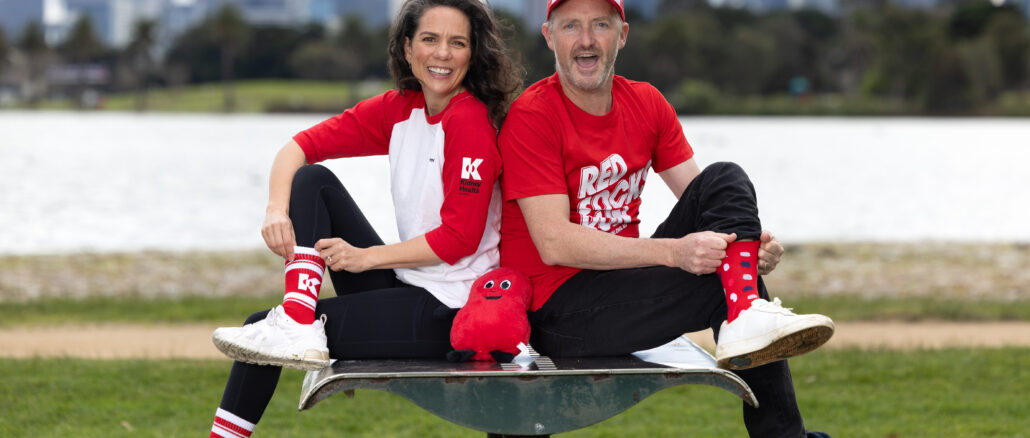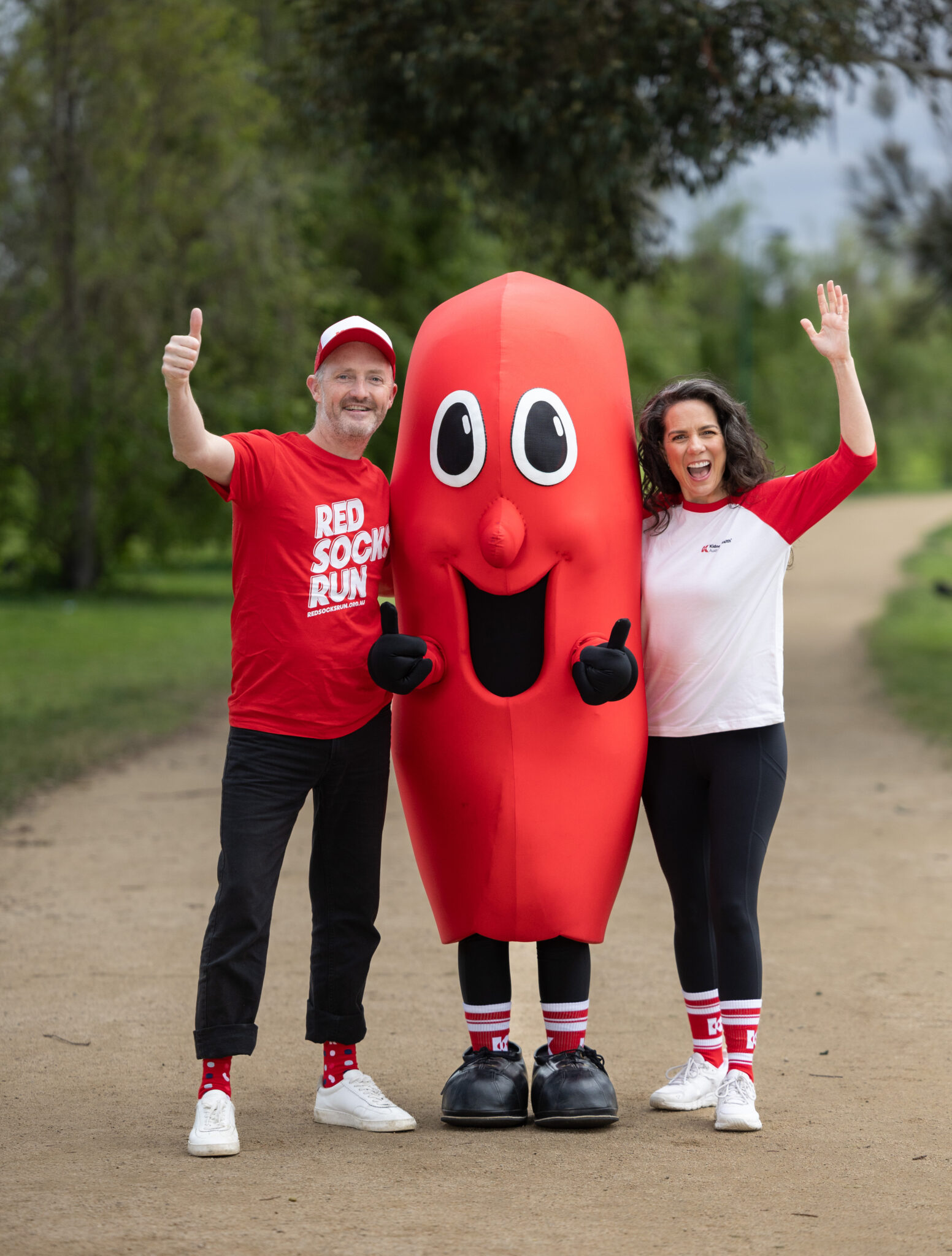
HELP FIND THE 1.8 MILLION AUSTRALIANS UNAWARE THEY HAVE SIGNS OF KIDNEY DISEASE
This October, Kidney Health Australia is calling on all Aussies to outpace kidney disease by pounding the pavement and raising vital funds and awareness as part of this year’s Red Socks Run.
Having gone through a major health scare as a child, much-loved Australian actress Michala Banas knows all too well the importance of kidney health.

“It’s such an easy thing to keep an eye on,” she said. “The next time you’re at a doctor’s appointment just ask them to check your kidney function with a simple test. That kind of stuff can really save you down the line because once it’s too late, it’s really too late.”
Around 2 million adult Australians are living with chronic kidney disease, but 1.8 million remain unaware they have the condition. That’s because people can lose 90% of their kidney function without experiencing symptoms. The invisible nature of the disease means that early diagnosis is vital.
Kidney Health Australia CEO, Chris Forbes, said kidney disease had a massive impact on those affected, with many people plugged into a life-depending dialysis machine an average of 60 hours per month just to stay alive.
“The Red Socks Run 60km challenge is a way of stepping into the shoes, or socks, of someone sitting in a dialysis chair for 60 hours a week, and helps shine a stronger light on one of Australia’s least known chronic conditions,” he said.
“The leap from unknown kidney disease to kidney failure is often so sudden that people don’t have time to deal with their diagnosis before their lives are turned upside down and they become totally dependent on an external machine that keeps them alive. One day you’re fine and the next day facing a life sentence.
“People on dialysis remain largely invisible – they don’t look any different on the outside so the condition is less talked about. Yet, for the Aussies dealing with this and their families, it is life-changing, robbing them of their time and freedom.”
This year’s Red Socks Run is more than just a fun physical challenge – it’s a powerful statement of solidarity and determination, as Kidney Health Australia rallies participants to register and donate to the cause.
People can either run, walk or ride 60km or create a team of friends or colleagues to inspire one another. Either way, they’ll be supporting the life of someone living with this debilitating and deadly disease.
Mr Forbes said the 60km challenge is inspired by the courageous people living with kidney failure who require life-saving dialysis.
“During dialysis treatment, people’s bodies get extremely cold, especially their feet. This is why we are asking people to buy the special Red Socks in their honour and get involved in the Red Socks Run.
“Kidney disease seems to be the least known of all chronic conditions. People don’t realise just how vital their kidneys are. I’m urging all Australians to raise awareness of kidney disease, buy some socks and help us raise funds for this lesser-known condition.”
On average, 66 Australians will die every day with kidney disease, for which there is no cure.
Turn your good health into the support that can save a life by signing up to the Red Sock Socks Run and buying a pair of limited-edition Red Socks to wear proudly throughout October.
To register for Kidney Health Australia’s Red Socks Run, visit redsocksrun.org.au.
Kidney Health Australia is the recognised voice for kidney disease in Australia, striving to reduce the incidence of the disease in the community through awareness raising activities targeting those at risk and saving and improving the lives of those who are affected.
For 55 years, Kidney Health Australia has worked tirelessly to support people living with kidney disease, connect them and their families with vital information, programs and services; as well as advocating on their behalf for health initiatives that will improve their quality of life and health outcomes.
To find out more visit www.kidney.org.au.
Kidney Health Key Statistics:
- On average, 66 people in Australia die with kidney-related disease each day – more than breast cancer, prostate cancer and road accidents.
- People on dialysis often spend on average 60 hours a month strapped to a machine to stay alive.
- 2 million Australians have signs of kidney disease – and 1.8 million don’t know it.
- 90% of kidney function can be lost without any symptoms – the disease is a silent killer.
- 1 in 10 Australians have signs of kidney disease.
- 1 in 6 hospitalisations are kidney-related.
CASE STUDIES:
BRISBANE – CARLA McNAUGHTON – 39
IT consultant Carla McNaughton’s life was turned upside down at the age of 30 when a dietitian saw alarming results in her blood test, which prompted her to address impaired renal function. She has since endured the challenge of chronic kidney disease, navigating autoimmune attacks and stablising kidney function. The uphill battle reached its peak when dialysis became necessary, a draining commitment while Carla was juggling her career. She underwent a transplant in 2021, giving her a new lease of life, but she made a resolute and heartbreaking decision not to start a family due to health risks associated with chronic kidney disease.
MELBOURNE – FATHER AND SON – DAVID, 58, AND DECLAN, 24
When you first meet father and son duo David and Declan you can tell they’re very close. But their special bond actually runs much deeper. Last September, David bravely stepped in to be a kidney donor for his son, Declan. Three days after the transplant, Declan was rushed back to surgery after the transplant failed. Declan is back on dialysis every second day. He hopes he will be well enough to go back on the transplant recipient list. The experience has taught them that life is precious, and David is inspired by his son’s strength every day.
MELBOURNE – TAMARYN STEVENS – ATHLETE, 31
Golden girl Tamaryn Stevens was given a new lease on life thanks to her mum. Diagnosed with kidney disease as a child, she received her first transplant when she was 13. It lasted 14 years but failed in 2019. She was fortunate to receive a second kidney in 2020. As a child, Tam was restricted in participating in sport due to kidney disease, but she discovered a love of cycling as a teenager which has seen her travel the world as her health improved during both transplant journeys. Tam has a long list of Para-cycling accomplishments, including placing third at the World Transplant Games earlier this year.
SYDNEY – LEIF, 3, AND DAD KARI BERGSSON, 38
Leif was born with bilateral renal hypoplasia (both kidneys smaller than normal) and faced huge challenges from his first days. The condition was detected through a pre-birth ultrasound and an emergency caesarean followed, leading to an intensive care stay. His early years were marked by a failure to thrive and weakened immunity. Although his kidney function is monitored, the inevitability of stage 4 and 5 kidney failure and the need for dialysis clouds his future. Leif has endured so much at such a young age, and because of his constant health battle, a continuous cycle of medical appointments and hospital stays, daycare and socialising with other kids is not an option. His parents have scaled back their work to care for their son.
PERTH – MARK OKSANEN, 51
Mark, 51, a father of two, presented for a routine medical check-up in 2007 and his GP noticed elevated protein in his urine. He was monitored and eventually diagnosed with kidney disease. In 2021, he went on life-changing dialysis for hours every day and night, including while at work, until a transplant was found. A year ago Mark received the phone call that changed his life: a kidney match had been found and surgery took place within hours. His new kidney has enabled him to get into the activities he loved as a kid like soccer and athletics, and it enabled him to compete at the World Transplant Games in April this year.
ADELAIDE – RENEE, MUM, AND DAUGHTERS CHARLOTTE (12) AND ISABELLE (14)
Parents of two teenage girls, Renee and Shane are faced with the challenge of having two children diagnosed with chronic kidney disease. Isabelle’s diagnosis was confirmed when she was just six weeks old. With Isabelle now 14, Renee and Shane have navigated a relentless series of medical appointments, striving to control her blood pressure, combat infections, and keep her fragile life intact. With Isabelle’s kidney function now hovering around 25%, the family is gearing up for a transplant as her levels continue to dip. In 2012, Less than 24 hours after birth, Isabelle’s younger sister Charlotte was diagnosed with the same disease. Both Renee and Shane are matches for their daughters and plan to donate their kidneys, granting their girls the ultimate gift of life.
SheSociety is a site for the women of Australia to share our stories, our experiences, shared learnings and opportunities to connect.

Leave a Reply